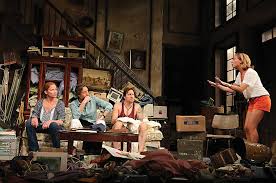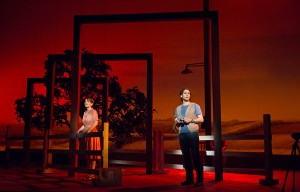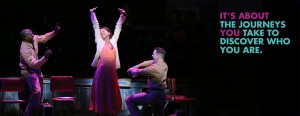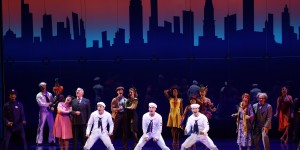At Jonathan Mandell’s invitation, I’ve taken up the challenge of creating a “best of” list for 2014. My list isn’t scientific, but more intuitive and off-the-cuff. The exercise gave me a chance to remind myself of and recommend to you some of the many (nearly 80) wonderful productions I saw this year. I’ve included 20, because a feminist spectator who subscribes to critical generosity shouldn’t stop at 10 . . .!
I describe them here in the order of my viewing through the year, rather than in a ranked hierarchy. I don’t think I could single out any one of these as the very “best.” Unless otherwise noted, I saw all of these productions in New York.
***

Stop Hitting Yourself, by the Rude Mechs at Lincoln Center Three. This Austin-based theatre collaborative continues to innovate its form and content, always surprising me with its delightful, theatrical irreverence but sincere humanism. In a story about the contemporary gods and goddesses of the money that rules us all, they engaged the audience (literally, participation as well as direct address) in a fluid, hopeful, fantastical narrative about, among many other things, theatre and performance itself (enhanced by Mimi Lien’s brassy, Las Vegas-inspired set). Lana Lesley remains a great gift to the American theatre, a performer with so much intelligence and warm charisma that it’s difficult to tear your eyes from her any time she’s on stage. And Thomas Graves balances her zany humor with a precise, more sober, powerful physical presence that always feels thoughtful and interesting. I’ll travel great distances to see anything the Rude Mechs produce. You should, too (here’s a production montage video).

Ruff, written by Peggy Shaw, directed by Lois Weaver, at LaMama ETC. The redoubtable Peggy Shaw suffered a stroke a few years ago, which left her with some memory loss and a deep perspective on what it means to be alive. Ruff partly narrates her health crisis, and partly continues Shaw’s tradition of gender performativity and charismatic solo performance. She’s irresistible, moving, and wise, a long-time treasure of the feminist-lesbian-queer performance scene. Don’t miss her solo shows, as they offer a chance to absorb Shaw’s life lessons as a 60-something butch lesbian, and her talent as a lounge act-stand-up-comic-storyteller. (Full Feminist Spectator post here.)

Cherokee, written by Lisa D’Amour and directed by Anne Kauffman, the Wilma Theatre, Philadelphia. I’m looking forward to seeing D’Amour’s new play, Airline Highway, which recently opened at the Steppenwolf Theatre in Chicago. Cherokee excites with its insights into race and gender privilege, through a play that stretches the envelope of realism to consider how we can or can’t escape conventional lives. D’Amour is deeply humanist in her ethical inquiry into how we choose to live our lives and interact with one another. Her theatrical metaphor, illuminated by Mimi Lien’s inventive scenic design of a camping site, uses getting lost in the woods to ponder whether we can choose to escape the grids that confine us, practically and ideologically. D’Amour is also a talented collaborative artist, working with her art partner, director Katie Pearl (they go by PearlDamour), on a community-based project called Milton that I hope to see sometime in the new year.

Row after Row, written by Jessica Dickey, directed by Daniella Topol, for the Women’s Project at City Center. I was surprised by how affecting I found this three-hander about Civil War reenactors, and the new woman who insinuates herself into two men friend’s post-performance drink at a bar. The occasion becomes a thoughtful exegesis on relationships, history, and gender inequity (and not just on simulated Civil War battlefields) and the production was modest but poignant. The Women’s Project, under Julie Crosby’s direction, grew into a worthy production company in the last decade. Now helmed by Lisa McNulty, I’m looking forward to the Women’s Project’s 2015 season.

Dinner with Friends, written by Donald Margulies, directed by Pam MacKinnon, Roundabout Theatre. This revival of Margulies 1999 Pulitzer Prize-winning play got all the details right, from the ruefulness of a long-married couple watching their closest friends dissolve their own relationship, to the complexities of presuming that starting over is always the best way to a better life. MacKinnon has a knack for soberly realist productions like this. When Karen (the terrific, wry Marian Hinkle) and Gabe (Jeremy Shamos, thoughtful and sad) make their bed together, their movements are neatly choreographed, so accustomed are they to working in sync at quotidian household tasks. Margulies and the terrific cast look with a clear eye at the costs and benefits of staying together instead of moving apart.

Stage Kiss, written by Sarah Ruhl, directed by Rebecca Taichman, at Playwrights’ Horizons. Jessica Hecht is one of the best stage actresses of our generation, and Sarah Ruhl’s new comedy, fleetly directed by the talented Rebecca Taichman, gave her lots of scenery to chew as an actor who’s cast across from an ex (a perfectly taciturn, stalwart, and sexy Dominic Fumusa). Michael Cyril Creighton, in various roles, including one as another actor flummoxed by the unraveling emotions among his fellow cast members and daunted by standing in as the romantic lead, helps keep the mood funny. Ruhl’s lark is a valentine to the theatre.


Love and Information, written by Caryl Churchill, directed by James Macdonald, for the New York Theatre Workshop at Minetta Lane Theatre. This visually stunning production, imported from the Royal Court in London, is composed of a series of very short, thematically connected but narratively disparate scenes, visually constructed in ways that surprise and sometimes delight. On the small black and white set that appears to be an open box with no exits (designed by Miriam Buether to look strangely askew), the lights go up and down to reveal startling changes of characters, props, and set pieces that have somehow been moved on and off with alacrity during blackouts. In these vivid settings, numerous actors in various character configurations perform snippets of dialogue that sink in and accumulate into a theatrical and emotionally involving production.

A Doll’s House, written by Henrik Ibsen, English language version by Simon Stephens, directed by Carrie Cracknell, at the Brooklyn Academy of Music. This, too, was a London import, this one from the Young Vic and notable for Cracknell’s breathtakingly original direction. On a set (by Ian MacNeil) that turned and rotated as the play’s characters roamed from room to room in the domestic space of their stifling home, Hattie Morahan, as Nora, brought new insights to the iconic role. Cracknell’s fluid, cinematic staging allowed the audience to see the canonical work in new ways. This is a play to which new interpreters bring ever more feminist meanings. Cracknell’s keen political vision was flattered by her nearly environmental staging.

Appropriate, written by Branden Jacobs-Jenkins, directed by Liesl Tommy, at Signature Theatre. Jacob-Jenkins’ sharp, dark comedy illustrates the intractability of racism and how it lives on as an indelible historical memory and a contemporary social practice. A white family visits their recently deceased patriarch’s homestead in Arkansas, only to uncover the remnants of his proudly racist past. By writing a play with only white characters, Jacob-Jenkins puts the responsibility for social injustice where it belongs: at the feet of the family who want, more than ever, to believe that they’re removed from a past that nonetheless stains their history and their present. Liesl’s production brilliantly theatricalized hierarchical social structures in which straight white Christian men continue to come out on top of the heap of power.

Bridges of Madison County, book by Marsha Norman, music and lyrics by Jason Robert Brown, based on the novel by Robert James Waller, directed by Barlett Sher, on Broadway. This musical adaptation of a sentimental best-seller that was already adapted into a movie didn’t last long on Broadway. But the show used the musical theatre idiom to bring new and much less sappy colors to the story. As the housewife surprised by large emotions for a man who passes through town while her husband and children are away, Kelli O’Hara brought the right mix of yearning and resilience. Steven Pasquale, as the traveler, proved a sexually disruptive but somehow respectful presence. Sher’s used the townspeople as an ever-watchful, omnipresent Greek chorus, underlining the suffocations of small-town life. Michael Yeargan’s gorgeous set, graced by Donald Holder’s lighting, at once evoked and gestured beyond the constraints of mid-Western farm life.

Violet, music by Jeanine Tesori, book and lyrics by Brian Crawley, directed by Leigh Silverman, for Roundabout Theatre on Broadway. Tesori’s lovely music was delivered by Sutton Foster’s prismatic performance as a young woman in the 1960s who travels across the country to visit an evangelist she believes can heal the disfiguring scar on her face. Along her journey from North Carolina to Arkansas, she meets two soldiers, one African-American, one white, and learns how race and gender differences structure American society in ways more profound than her inability to be “beautiful.” Foster’s searching performance and Silverman’s tight direction made Violet an indelible portrait of a young woman whose personal growth parallels the national social justice struggles of 1964.

Star of the Sea, devised by Moonfish Theatre, adapted from the novel by Joseph O’Connor, at the Galway International Arts Festival, Ireland. This inventive, moving production demonstrated how simple theatricality can communicate the most profound feelings. With a six-person cast that circulated through multiple roles, provided musical accompaniment and scenic effects, and never left the stage, O’Connor’s epic story became a Brechtian examination of the effects of history and power. The play narrates the story of a famine ship that left Ireland for America. The production observes interlocking lives play out their differences in power, social standing, and aspiration before, during, and after the ship sails. (Full Feminist Spectator post here.)

Ballyturk, written and directed by Enda Walsh, Galway International Arts Festival, Ireland. This three-hander starring Ireland’s finest male actors—Cillian Murphy, Mikel Murfi, and Stephen Rea—burst across the stage like fireworks, its story elliptical and its setting and visuals stunning. In an absurdist universe with its own rules, two men (Murphy and Murfi) trapped in a kind of No Exit/Waiting for Godot scene devise stories and characters, enacting their own worlds in repeated, ritualized enactments. When another character (Rea) arrives to shift the relationships, it’s clear something final and deadly has exploded onto the scene. The breath-taking production performs multiple interpretations of masculinity and Irishness, while it reinvents the possibilities of theatre. (Full Feminist Spectator post here.)

Panti: High Heels in Low Places, written by Panti, produced by THISISPOPBABY, at the Galway International Arts Festival, Ireland. Panti is Ireland’s internationally known drag queen, who became embroiled in a controversy over homophobia last January that resulted in the Abbey Theatre extending her an invitation to speak from their stage. Panti’s eloquent “Noble Call” speech went viral and the experience inspired her solo stage show, High Heels in Low Places. She narrates the events that lead to her appearance at the Abbey, peppering the story with wryly comic and queer observations. With unstoppable energy, cheery charisma, and the talent of a stand-up comic-meets-story-teller-meets-actor, Panti dismantles gender stereotypes with verve and wit.

Three Acts, Two Dancers, One Radio Host, choreographed by Monica Bill Barnes, Town Hall. This radiant, warm evening of dance and story-telling combines the post-modernist talents of choreographer Monica Bill Barnes, performer Amy Bass, and radio host/storyteller/personality Ira Glass in one of the most enchanting evenings of my theatre-going year. With a light touch but deep soul, the three performers gleefully and gamely chart the edges of life, death, and the myriad relationships we stage in between. (Full Feminist Spectator post here.)

On the Town, music by Leonard Bernstein, book and lyrics by Betty Comden and Adolph Green, directed by John Rando, on Broadway. Rando creates an incandescent revival of this classic musical, staging a deliriously pleasurable conversation with old forms and new ideas. Three sailors on a day’s shore-leave in New York City court three different women while enjoying urban adventures. Rando’s cast enacts the musical’s gender reversals with perfect comic timing and contemporary insight, as the women prove more aggressive and eager than the sailors. Beowulf Boritt’s dynamic, thrilling set design puts the whole show in motion. Animated projections of skyscrapers and New York landmarks fly by, gilded with an occasional glowing practical light to make the images look three-dimensional. Rando blends the music with the humor and the balletic dancing to create a knock-out production that’s a joyous celebration of performance itself.

The Curious Incident of the Dog in the Nighttime, written by Simon Stephens, adapted from a book by Mark Haddon, directed by Maxine Elliott, on Broadway. Adapting a first-person narrative about an autistic boy investigating the mysterious murder of a neighbor’s dog, Stephens and Elliott use imagination and kinetic theatricality to stage his world from Christopher’s perspective. The visually ingenious production is physically muscular (recent Julliard graduate Alex Sharp never stops moving) and surprisingly thrilling, as the creative team layers an accumulation of effects that suggest what it feels like to be overly sensitive to noise and stimulation. The play could have fallen into the big pitfalls of representing disability, but manages to steer clear of thoughtless pity and opt for a rendering of difference that tells us as much about the potential of theatre as it does about psychological challenges.

Father Comes Home from the Wars (Parts 1, 2, & 3), written by Suzan-Lori Parks, directed by Jo Bonney, at the Public Theatre. Parks, like Caryl Churchill, uses theatre in ever reinvigorated ways to chronicle history. This multi-layered story about the Civil War begins an epic narrative that Parks intends to continue, but which stands alone as an incisive indictment of antebellum power and politics, all played out through the quotidian, personal micro-aggressions of daily life. Bonney’s unsparing, unflinching direction keeps the focus sharp, and the ensemble cast boasts smart and effecting performances. Parks mixes fantasy and reality to tell her story, and Bonney and the actors follow her deftly through the absorbing mix.

Disgraced, written by Ayad Akhtar, directed by Kimberly Senior, on Broadway. This Pulitzer Prize-winning drama is a problem play, with high emotional and political stakes. Akhtar (whose The Invisible Hand, at New York Theatre Workshop, was also one of the year’s best), addresses intractable issues with care and respect, pitting five characters who represent different identity positions and political perspectives against one another without disparaging any of them. Akhtar’s debate charts how Americans navigate a charged political atmosphere in which the very identity markers that hyphenate them are fraught with complexity. Because they make their choices in the context of neoliberal capitalism, none of the characters end up ethically unscathed. But the play scrutinizes how people who are privileged enough to have choices go about making them, in a political and cultural moment when the spoils still go to the white, the male, the wealthy, and the Christian.

The Oldest Boy, by Sarah Ruhl, directed by Rebecca Taichman, Lincoln Center Theatre. The Oldest Boy takes a different route through religious and cultural differences to meditate on the cost of separating from loved ones. Ruhl tells a story about a white woman married to a Tibetan man whose three-year-old son, Tenzin, is presumed to be the reincarnation of a powerful lama. The play mixes realism with direct address and Asian theatre techniques that lift it into gorgeous theatricality director Taichman deftly manages. Tenzin is represented by an expressive, eerily human-like Bunraku puppet and masked and costumed dancers move cross a heightened second stage above the action. The production’s vivid theatricality highlights Ruhl’s desire to engage Tibetan Buddhism’s compassion and reverence for life in all its incarnations with a simple, visually rich interplay between Asian and western stagecraft. And the luminous Celia Keenan-Bolger plays Mother with vulnerability, openness, and emotional precision.
The Feminist Spectator